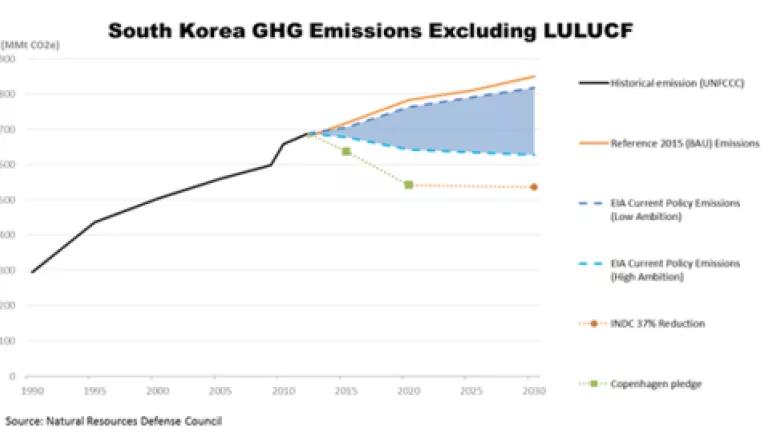
South Korea has just proposed a target to cut their emissions in 2030 as a part of their international commitment for the climate agreement to be reached this December in Paris. As the seventh largest emitter in the world they are an important player. They join an emerging group of countries that are outlining their post-2020 climate targets well in advance of Paris. This target is much improved from the inadequate proposals that they outlined last month. This target should be strengthened in the coming months.
South Korea formally proposed that it will cut its emissions to 37 percent below business as usual by 2030. This target reflects a much stronger target than they were floating domestically. This official target reflects a cut below what the U.S. Energy Information Administration had outlined as their emissions projection with "high" and "low" ambition (see figure).
Before the Copenhagen Climate Summit South Korea showed that it was prepared to be a climate leader. It became one of the leading voices for Green Growth - helping to grow the economy without destroying the planet. It announced a strong target to reduce its emissions to around four percent below 2005 levels by 2030 on a trajectory to a significant decline in their emissions. They adopted a national cap and trade program to help address their carbon pollution from their biggest sources. And later it became the host country for the Green Climate Fund - the new multilateral fund to help developing countries build low carbon and climate resilient economies. Each of these steps earned them praise as a global climate leader.
That "leader" mantle was coming into question when they were considering post-2020 climate targets which independent analysts classified as "inadequate". For domestic discussion South Korea proposed four potential post-2020 targets ranging between 15 and 30 percent below their new BAU by 2030. Each of these proposed targets would have resulted in emissions in 2030 that were higher than their target in Copenhagen. So it is a welcome sign that they decided to propose an even more aggressive target than the earlier versions.
As we get closer to Paris there are a smaller number of countries that haven't yet put forth their proposed post-2020 climate targets. We hope that countries will continue to strengthen their targets over time so these initial proposals become the floor, not the ceiling. South Korea should strenghten this target in the coming months as it still reflects a weaker emissions trajectory than their Copenhagen target.
-------------------------
This post benefited from the analysis of the target done by Wusi Fan and Han Chen.
This post has been updated to reflect the conclusion that their target is a weaker trajectory than their Copenhagen target.

